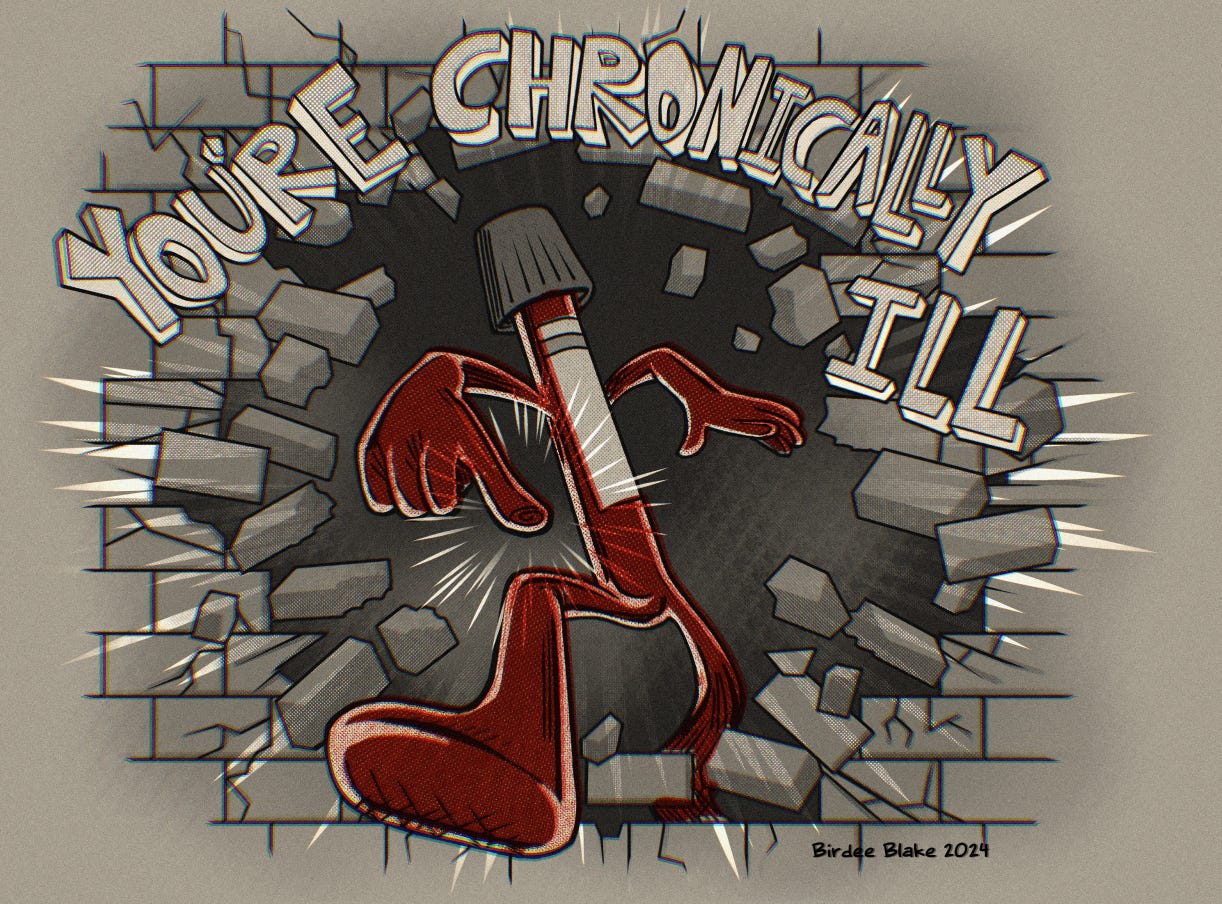Learning to Let Go - How To Accept Your Chronic Illness
When you're chronically ill - your world turns upside down. Managing your illnesses, staying on top of symptoms and navigating healthcare is exhausting. Learning to Let Go can make things easier.
Welcome to the third and final article in my series about MCAS (Mast Cell Activation Syndrome). This one was the hardest to write - because Learning how to Let Go was one of the most difficult things I’ve ever had to do. I sincerely hope that my story of how I came to accept the unknown, make peace with my body (and my mind) and let go of the constant search for answers will help others with this difficult task.
If you missed the first article in the series - you can check it out below. This post will focus mostly on Mast Cell triggers - but I firmly believe that the lessons contained within can be of benefit to anyone struggling with chronic illness.
If you’re dealing with chronic illness - you’ve no doubt spent an inordinate amount of energy trying to figure out your triggers and how to minimize them.
We’ve all been there - you think you’re doing everything ‘right’ only to end up in a wicked flare that derails all your progress. The worst part? You have NO idea what caused it.
I will be honest - I’m a person who needs solutions. I need to feel like I’m DOING something proactive to help myself. I’m not great at just accepting things as they are - and I never have been.
Where Are my Type A People At?
I’m your typical type A person. I was always ‘go go go’ and a relentless worrier. In kindergarten my teacher told me I should have ‘WW’ stamped on my forehead - for ‘Worry Wart’. That trend continued for most of my life. Why get a 99% on a project when you can do extra credit and get 105?!? Why take a spare period when you could enrol in another class and add something else to your college applications? Why rest when you could be DOING something.
This inability to just ‘be’ is a terrible quality to have when you’re chronically ill. It causes us to push our bodies to the breaking point - and our minds aren’t much better. Negative self talk is so damaging to mental health and yet I spent years with a cruel inner monologue.
“You could be doing more.”
“Why are you sleeping in so late - that’s not productive.”
“Is the pain really THAT bad? I’m sure you could get out of bed if you really tried.”
“Why aren’t you going to that party/dinner/event? Everyone thinks you’re lazy and antisocial.”
“Do you really need to stay home from work? You’re being lazy. Force yourself to go in.”
“Do you really need to go to the hospital? It’s not that bad - just push through.”
“See? The ER doctor didn’t even help you. It was stupid of you to go in. There’s nothing wrong. Just try harder.”
I can’t begin to tell you how damaging that monologue was to me. I was effectively gaslighting myself - and there was absolutely no need as society was already doing it for me.
When I was FINALLY diagnosed with my various conditions - after YEARS of doctors telling me I was ‘fine’ or ‘anxious’ or ‘lazy’ - it was a bittersweet moment. In some ways I cherished the validation that I had needed for so long. In other ways it felt like disability came crashing through my wall like the over enthusiastic kool aid man.
Announcing its presence in a booming voice and informing me - without any hesitation - that my life would never be the same again.
Image courtesy of Birdee Blake. This is a chronic illness take on the Kool Aid Man - we affectionally dubbed it Blood Vial Man. Image of a red vial of blood with a white label and a grey top crashing through a brick wall. Text reads “You’re Chronically Ill”
What Do you Do When Your World Changes Overnight?
Some people may think it’s strange that I say having a diagnosis felt like a massive shift in my reality - because technically I had been sick for years. The diagnosis just gave it a name. It made it official.
It meant that it wasn’t all in my head - and that pushing through the pain was actually doing damage. It meant I had to stop. I had to accept that I wasn’t fine and that my life going forward would look very different.
Acceptance is Not Easy - Nor Does it Equal Giving Up
Before I go any further - I want to make it crystal clear that accepting your disabilities does not mean you’re giving up. It doesn’t mean you can’t hope for a cure or better treatment options. It doesn’t mean you can’t work towards getting better.
It just means that you make a deal with yourself and your body. To cherish it and treat it more kindly. To not push it past its limits. To stop the negative inner monologue that tells you you’re not good enough. To put the ‘shoulds’ away forever. It means leaning into accommodations and being willing to be open and vulnerable about your struggles. It means finally asking for - and giving yourself - what you need instead of what others expect from you.
Does it sound hard? It is. And that’s OK. Acceptance doesn’t happen overnight. Illnesses often do - but it can take our minds a long time to catch up.
I certainly didn’t reach acceptance quickly. In fact I threw myself into research - trying to learn everything I could about my conditions so that I could avoid flares. Nowhere was this more true than with my MCAS. It’s the condition that has the most ‘triggers’ and therefore - in a strange way - the one you have the most control over.
Diet and lifestyle changes can make a BIG difference in your quality of life and the amount and severity of symptoms you experience.
Being classic Type A - I made ALL the changes. I overhauled my whole life. I started tracking symptoms as well as food, activity, personal care products, air quality and more. I kept detailed lists of what I did, what I ate and how I felt in the hopes of establishing patterns. It was exhausting.
It did yield some positive results. I was able to establish a number of patterns and obvious triggers that made sense to avoid. I wrote about these in more details in Part Two of my MCAS Series:
I made changes, I patted myself on the back and I assumed I could move forward without any MCAS attacks or episodes of anaphylaxis because I had DONE THE WORK.
Side note - before my MCAS became severe I followed a raw vegan diet that was anti-inflammatory and included creative dietary swaps to maximize nutrition and minimize chronic illness symptoms. Some people have expressed interest in having me share some of these recipes. Things like how to make your own nut/seed mylk or cheese, banana ‘ice cream’, avocado pudding, seed ‘butters’ and raw vegan sauces. If that would be helpful please leave a comment or send a message!
An MCAS Patient Plans - and Mast Cells Laugh
I quickly learned that with mast cells - and all chronic illness - there are no guarantees. You can do everything ‘right’ and still end up incredibly sick. It’s punishingly cruel. We make so many sacrifices to try and help our bodies adapt to our conditions - and sometimes they don’t seem to matter at all.
It can be tempting to give up - to wonder ‘why am I sacrificing so much if I’m going to flare anyways?’ I certainly felt that way.
It helps to remind myself that the sacrifices are REDUCING the number and severity of the flares. My diet and lifestyle changes have lowered the overall inflammation levels in my body - so it’s entirely possible that my attacks would be worse and more frequent if I gave up trying to keep my mast cells happy.
That knowledge helps - but doesn’t eliminate - the crushing frustration that comes with flares of no known cause. I can’t tell you how many nights I’ve spent awake - often on the bathroom floor - choking back tears of angst and hurt because I’m facing yet another hospital trip and I have NO IDEA why.
The anger and pain of constantly wondering ‘What did I miss? What should I have done differently?’ was not doing my body any favours.

Image Description: Photo of a woman sitting cross legged from behind staring out at a sunrise/sunset.
I Had To Learn to Let Go
This is perhaps one of the hardest skills a chronic illness patient has to learn. The art of letting go. Of allowing yourself to accept that sometimes you won’t have the answers. That you can do everything ‘right’ and still end up in a flare, in the hospital or dealing with a crash.
For years I obsessed over patterns - trying to nail down every trigger and setback to a specific cause. The only thing I learned was that I was wasting precious energy trying to look for answers that in many cases simply didn’t exist.
Thankfully - in the years prior to my diagnosis I had been an avid yogi and had participated in a number of meditation courses which helped give me the skills to tackle this problem. In the future I plan to write an article on how I found meditation - quite by accident when a meditation teacher encountered me crying on a Starbucks patio!
Learning to let go - for me - involved a few steps:
Mindfulness: Working to be in the present moment without worrying about what happened before or what might happen in the future
Meditation: Even if I could only manage one minute a day - giving myself that quiet time to be still and clear my mind has brought a lot of comfort
Forgiveness: This is a BIG one. We often blame ourselves when we’re dealing with chronic illness. We tell ourselves we should have done better or we should have avoided doing “such and such” an activity. We rarely give ourselves props for what we manage to get through every day - but we’re quick to criticize. I had to learn to forgive myself for any perceived mis-steps and not lay blame
Positive self talk: I had to start talking to myself the way I would talk to a friend or loved one. I was SO mean to myself - I never would have been that hard on someone I cared about. I worked to change my inner monologue to one of love and support. I reminded myself that I was doing the best I could - and that was more than enough
Grace: I gave myself grace. I stopped punishing myself for flares by reminding myself that our bodies are complex systems and we can’t possibly hope to know all the answers. Searching for every trigger wasn’t helping me - it was exhausting me. I told myself that sometimes it was OK to not know - and focusing on how to get through a flare or a trigger was a more productive use of my time than agonizing over the cause
These skills didn’t come easily - and there are still days where I struggle. Where I ruminate and can’t stop searching for a cause of a flare.
Practice makes it easier - and I work hard at this every day. I have notes on my mirrors that remind me to breathe and smile. Post Its that tell me I’m safe, happy and loved. Anything to try and convince my brain and my nervous system that things are ‘ok’.
If this is something you’re struggling with - here’s a tip I received from my meditation class that I hope will inspire you to work to learn to let go:
Much suffering comes from attachment and expectation. We expect a day to be good or bad - and when our experience doesn’t meet our expectations we become upset. We run from suffering. We think of pain and sickness as inherently bad - and try to avoid them at all costs. This avoidance brings suffering. It takes tremendous effort. If we can work to look at suffering as neither good NOR bad - something that just ‘is’ - we can release the desire to outrun it. Be still in the present moment. Remember that nothing is permanent. Everything that’s happening will pass and be replaced by another moment. If you have a thought - observe it, recognize it, and immediately let it go.
I can honestly say that when I stopped trying to outrun my suffering - it became easier to cope. I’ve accepted that some days will be good and some days will be bad and I have virtually no control over what happens.
I’m going to do something I don’t usually do and share a personal photo that was taken when I was regularly doing yoga before my disabilities became severe. My journey with both yoga and meditation helped prepare me to live with severe chronic illness - and I encourage anyone who’s able to try and adopt both a yoga and a meditation practice. If you’re struggling - you can check out
who has severe ME/CFS but posts regular guided meditations to help other patients.Image Description: Kelly standing at dusk on grey rocks in front of Lake Louise. She’s wearing black pants and a grey sweater and her back is facing the camera. She’s doing Reverse Warrior pose.
When we start prioritizing letting go - when we move towards acceptance and release the need to control everything - we can begin to find peace. When you’re sick and suffering every single day - any moments of peace and calm are priceless.
Lastly - don’t be hard on yourself if this process doesn’t come naturally to you. It didn’t come naturally to me either. Despite years of practice - there are still days that I can’t ‘let go.’ Days I struggle, over analyze and get upset at my suffering. Days where I’m focused on attachment and forget to stay in the present moment. It’s OK - you’re not alone. I don’t think anyone gets it right one hundred percent of the time.
All you can do is wake up the next day and try again. Forgive yourself, remind yourself this is not an easy thing you’re trying to do - and try again. In time it becomes easier.
What do you want to learn about meditation, mindfulness and letting go? Was this article helpful? Is there something you would like to see included in greater detail in a a future article? Let me know in the comments below!
For an excellent look at how to lean in to your conditions and make your home and life more accessible - as well as a beautiful speech on the long road to acceptance - please check out this post from
“Living with a Spinal CSF Leak - Making Your Home More Accessible.” Jodi has EDS and MCAS and has been a tireless advocate for accommodation and acceptance.







Thank you for all your writings, this series, and this article, for which you had to dig so deep to share so much. You are very generous with your hard-won insights, and I am certain that you are helping more fellow travelers than you can ever know. On behalf of us all, many thanks. 🙏
Thank you. I've been dealing with health issues for over twenty years and I'm still unable to give myself a break. I always feel like I should be able to do more.